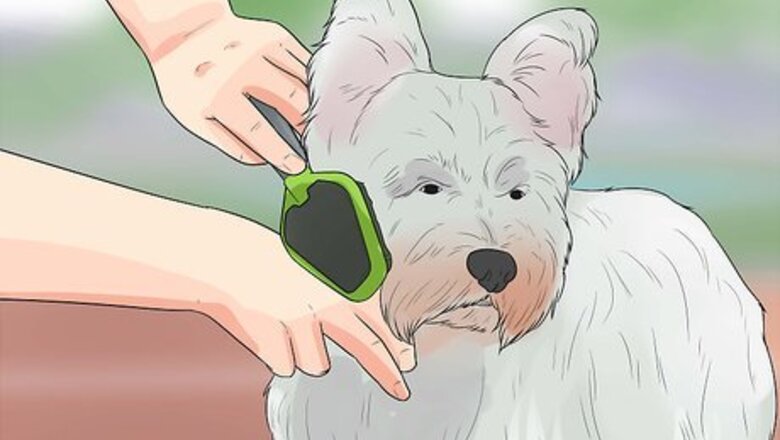
views
Grooming Your Westie’s Double Coat
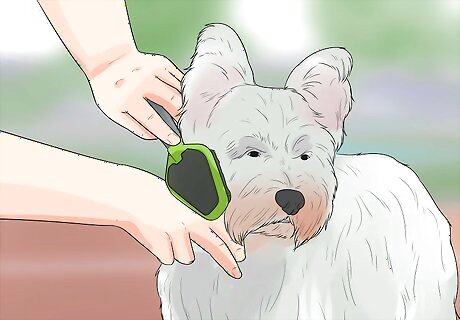
Brush your Westie every day. Westies have thick, double coats that needs regular brushing to look its best. This can help keep your Westie’s fur clean and allow his skin to breathe. Use a brush meant for dogs with thick hair. You can buy a special brush for your Westie at most pet stores or online pet retailers. Go slow and brush your dog in sections or layers. Once you complete one layer, move on to the next one. Praise your Westie as you brush him, and try offering him a treat after you finish brushing him.
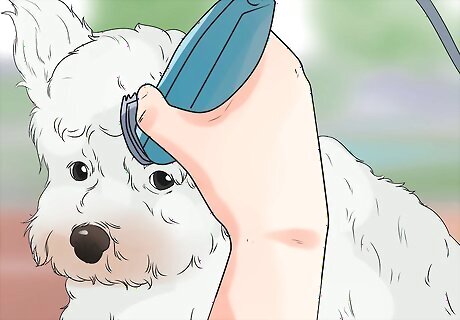
Plan to clip or strip your Westie’s coat on a regular basis. You’ll need to clip or strip your Westie’s coat or pay a groomer to do so a few times per year. Regular clipping or stripping will get rid of dead hairs and help keep your Westie’s coat looking shiny. Although clipping and stripping both remove dead hair from your Westie’s coat, they are different grooming processes. Clipping is when you use electric clippers to trim your Westie’s entire coat. Clipping produces a soft, short coat. Stripping is when you use your fingers to remove dead hairs from your Westie’s coat. This method is more popular with show dog owners. Stripping produces a coarse, wavy coat.

Take your Westie to a professional groomer. If you don’t have the time or patience to care for your Westie’s coat or other hygiene needs, hire a professional groomer for regular grooming sessions. It can be expensive, but may save you time and tears. Your regional Westie club may be able to recommend a local groomer who is experienced with Westies. The Westie Club of America has a list of local Westie clubs at http://westieclubamerica.com/regclubs/. Make sure to visit any groomer before you take your Westie. This can help ensure the environment will be calm and comfortable for your dog.
Clipping Your Westie’s Coat
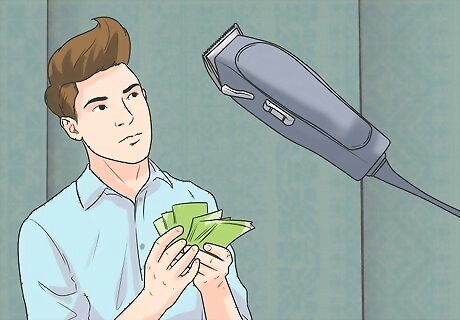
Purchase electric pet clippers. To clip your Westie, you’ll need to purchase an electric pet clipper. Look for a good quality pet clipper set that includes different sized clipper covers. You can find electric trimmers for dogs at most pet stores and online pet retailers. Never use human clippers on your Westie! Avoid using “skip tooth” blades. Skip tooth blades are those that have wider teeth. Avoid these blades because they can cut your Westie, especially on delicate areas such as the legs.
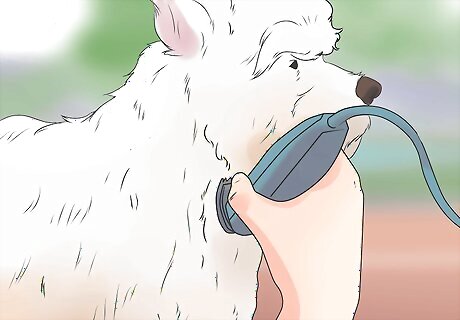
Apply gentle pressure. Make sure that you use gentle pressure when clipping your Westie’s fur. Pressing too hard may lead to a cut that is too short or even hurt your Westie. You only need to lightly guide the clippers along your pet’s body in order to remove the excess hair. Be extra gentle around your dog’s ears, anus, genitals, underbelly and legs so that you don’t cut him.
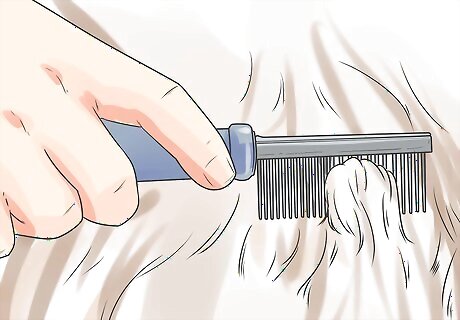
Follow the growth of your Westie’s coat when using clippers. Going against the growth of your Westie’s fur may result in a cut that is too short or that looks odd. To ensure that you are not trimming too much fur, trim with the growth of your Westie’s fur rather than against it. Try keeping a brush handy to smooth out the fur and remove stuck on hairs as you go.
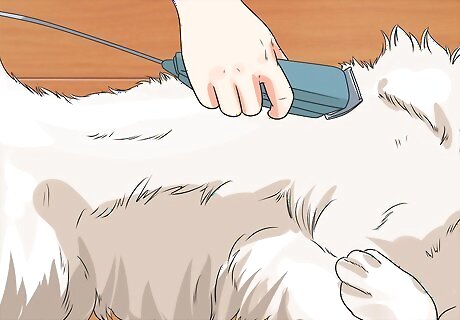
Trim your Westie’s body with the clippers. When clipping your Westie’s fur, you will need to trim his whole body with the clippers. Trim down the fur on his back, stomach, sides. and legs so that it is about two inches long all over. Do not use the clippers on your Westie’s head or face. You can use scissors to trim hairs on his head and face as needed, but you should not have to do much to his face.
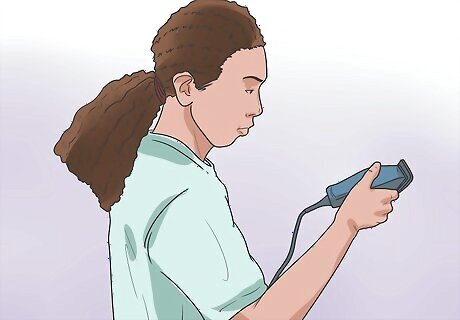
Check the blades of the clippers often to ensure that they’re not hot. If the blades become hot, then they may burn your Westie’s skin. Check the blades every couple of minutes to make sure that they are not hot. If the blades become hot, then turn off the clippers and wait until they cool down before continuing.
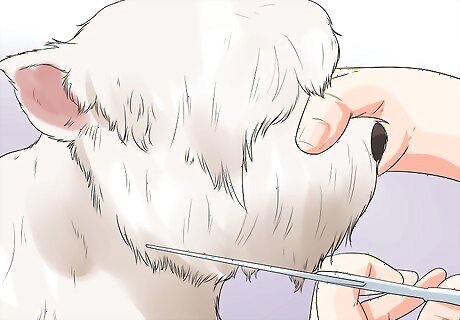
Touch up with scissors where necessary. You may notice a few spots that you missed or that were hard to reach with the clippers. You can use scissors to touch up these spots, but be careful. Do not put the scissors too close to your Westie’s body. You may also want to use a comb to serve as a guard between your Westie’s skin and the scissors.
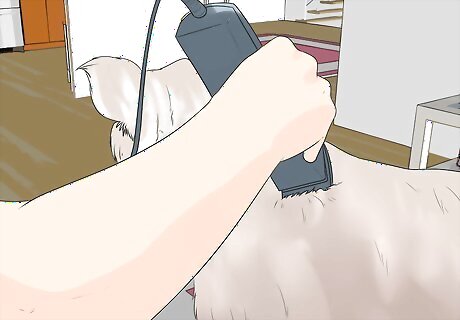
Go over your Westie’s coat a second time after bathing. Groomers will often clip more than once and you may want to consider this as well. You can clip your Westie before you bathe him and then go over his coat with the clippers after bath time to produce a smooth finish on the coat. Wait until your Westie is dry to clip his coat after bathing. Hair appears longer when it is wet, so clipping your Westie while he is wet may produce a shorter haircut than desired.
Stripping Your Westie
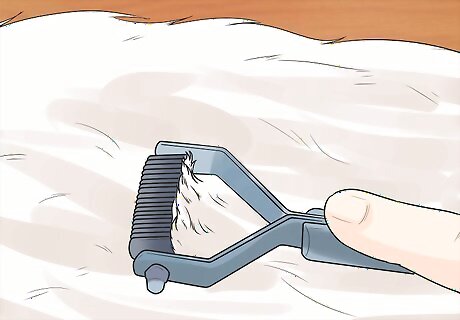
Strip your Westie’s coat when you notice dead hairs. Stripping pulls out the outer guard of hairs once the hairs “blow”—or die and start to shed off. Only strip once the coat is blown, which will make hair removal much easier and be less likely to hurt your Westie. Make stripping a regular part of grooming your Westie. If you don’t strip your Westie regularly, you may need to strip all the way down to his undercoat layer, which can leave him looking bare.
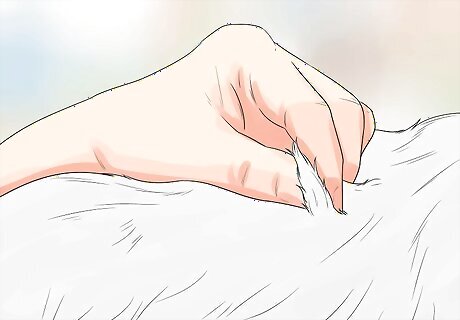
Use your fingers to pull out dead hairs from your Westie's coat. To strip your Westie, you’ll need to pull out dead hair with your fingers. Be aware that this can cause your Westie pain or discomfort if you don’t know what you’re doing. Do not try to pull out hairs that are still growing out of the skin. Grasp hairs that are sticking out further than other ones and gently pull on the hairs. If the hairs do not come out easily, then stop pulling. The hairs may not be ready to come out yet.
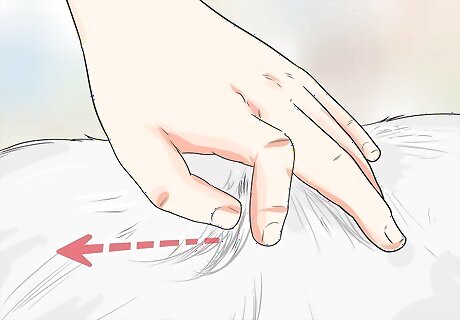
Go with the grain of your Westie’s fur. Always make sure to pull out hairs from the coat in the direction that your Westie’s fur is growing to make pulling out dead hairs easier and reduce discomfort for your dog. Go with the grain of your Westie's fur rather than against it.
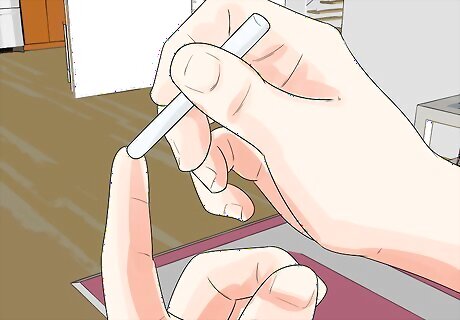
Apply chalk to your fingers if grasping hairs is difficult. If you find the coat is slippery or you are having trouble grasping hairs, then you can apply a bit of chalk to your hands and fingers. The chalk will help you keep a firmer grip on the hair and make it much easier to pull out dead hairs.
Bathing Your Westie
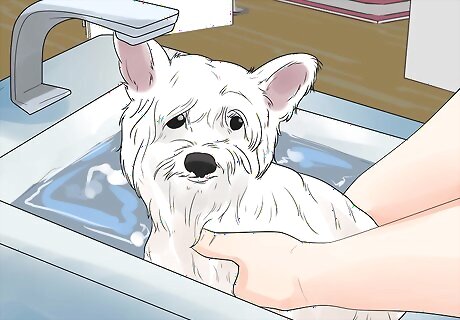
Bathe your Westie once every few weeks. In order to keep your Westie’s coat clean and soft, bathe him every few weeks unless he has a skin problem. This can help keep your Westie’s skin healthy and keep his coat looking lustrous and full. You may also want to bathe your Westie after you trim his fur to boost the effects and remove lingering fur. Keep in mind that bathing your Westie too often can remove his natural skin oils and make him susceptible to dry skin and other skin problems. Westies with skin problems, such as a yeast infection, may require weekly or more frequent bathing with a special medicated dog shampoo.
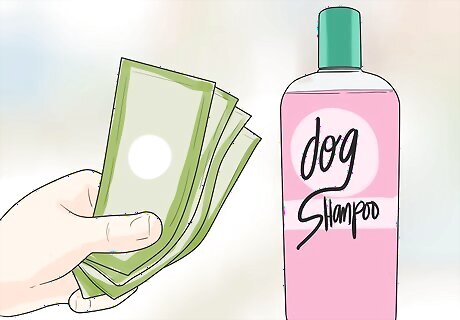
Buy a mild shampoo to use on your Westie. It is important to choose a mild shampoo that is formulated for dogs. Do not use human shampoo on your Westie Human shampoos can be too harsh on your Westie’s skin and may even turn his coat pink. You can buy shampoos for your Westie at pet stores or your vet’s office.
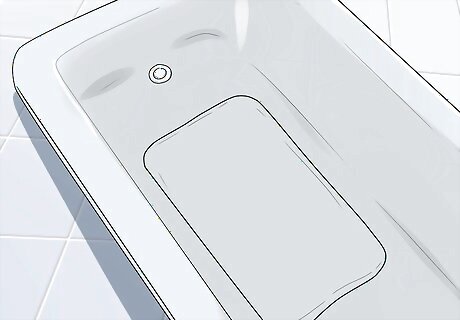
Prepare the bath. The best way to bathe your Westie is by using a hand held showerhead in a bathtub. If you do not have a showerhead, then a pitcher or large cup also works well. Place a rubber mat in the tub to keep your Westie from slipping. You should use warm, but not hot water to bathe your Westie. Test the water on the inside of your wrist. If it feels comfortable, then it should be okay for your Westie. Have a towel ready to dry off your Westie after his bath.
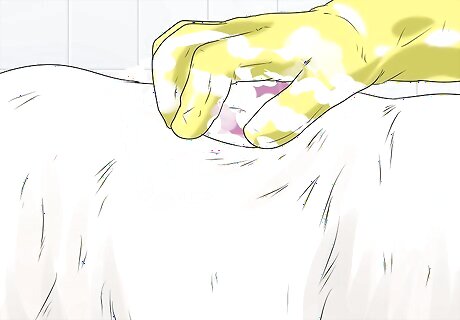
Shampoo your Westie’s fur. Place your Westie into the bathtub and start wetting down his fur with the shower head or pitcher. After all of his fur is wet, then you can apply some shampoo to his fur and start working it in. Make sure that you avoid his face, especially his eyes.
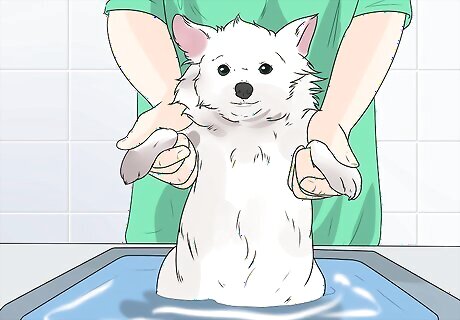
Rinse and dry your Westie. After you have shampooed all of your Westie’s fur, then you can rinse out the shampoo. Rinse until the water is no longer sudsy. Make sure that you rinse every surface that you applied shampoo to. After you have rinsed your Westie’s fur, then wrap him up in a towel and dry him off.
Caring for Your Westie’s Hygiene
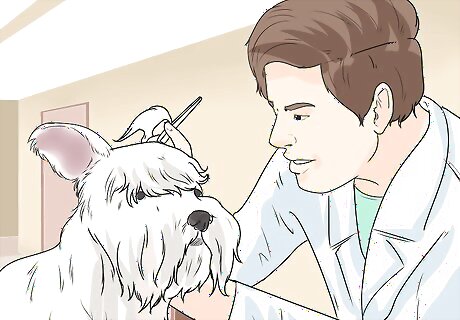
Clean your Westie’s ears. You should get routine checkups of your Westie at a vet, which includes assessing the health of his ears. In between vet visits, you can clean your dog’s ears occasionally or if they appear dirty. Consider asking your vet to show you how to properly clean your Westie’s ears. Use a cotton ball dampened in mineral oil, hydrogen peroxide, or a specific dog ear cleansing solution. Do not clean your Westie’s ears too frequently or too deeply. This can irritate the delicate skin. Never insert anything into your dog’s ear canal. If your Westie is sprouting hairs from his ears, you might need to tweeze them to prevent tangles or other problems. Make sure to check with your vet if this is necessary.
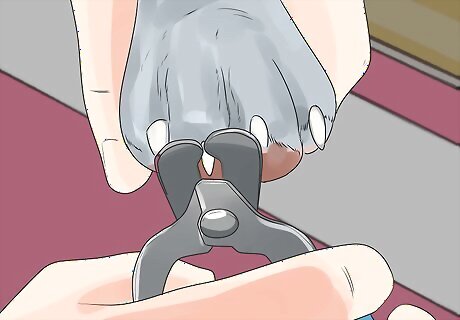
Cut your Westie’s nails. Trim your Westie’s nails whenever they appear too long. This can help prevent breaking, infection, and keep your dog from developing an irregular gait because his nails are too long. Never use scissors to trim your dog’s nails. Only use a dog nail clipper that you can purchase at a pet store or your vet’s office. Go slow and be careful when you trim your dog’s nails. You don’t want to hurt your dog. When trimming your Westie’s nails, avoid getting too close to the quick, which is the blood vessel inside of the nail. You can avoid the quick by trimming a small sliver of nail at a time and checking the cut surface of the nail after each snip. When you start to see a circle around the cut surface, then you are getting close to the quick and should not trim any more. Cutting your dog’s nails after a bath will make the quick more visible. You can also apply some baby oil to his nail, which will have the same effect. Give your Westie a treat for a successful nail clipping session. If your dog is resistant to the nail trimming, don’t force him. Leave him alone and try again later. Keep in mind that you can always take your dog to a professional groomer or to your veterinarian for nail trimming.
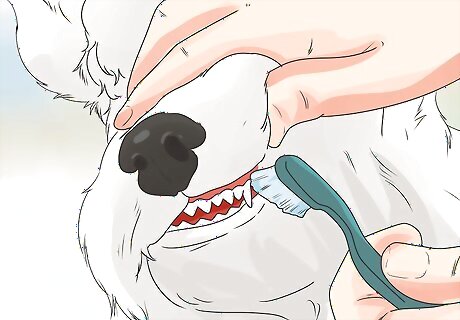
Brush your Westie’s teeth every day. Periodontal disease is a common problem seen by veterinarians. Keeping your Westie’s teeth and mouth cavity clean with daily tooth brushing and regular veterinarian visits can help keep diseases at bay and keep your dog’s breath fresh. Use a pet toothbrush, gauze pad, or a finger cot to brush your dog’s teeth. It’s important to use a pet toothbrush, which is extra soft and contoured for the shape of your dog’s mouth. Use a toothpaste specifically formulated for dogs. Never use human toothpaste or baking soda, which have chemicals that can harm your dog. You can get pet toothbrushes and toothpaste at a pet store or your vet’s office. Brush slowly and make sure to give your Westie lots of praise and petting. Coat each of the teeth with the toothpaste, which has an ingredient that won’t require much brushing on your part. Aim to brush for 30 seconds per side of your dog’s mouth. Give your Westie a treat for successful brushing sessions. Signs of poor oral hygiene or periodontal disease include bad breath, sensitivity around the mouth, loss of appetite, bleeding or inflamed gums, and missing teeth.




















Comments
0 comment